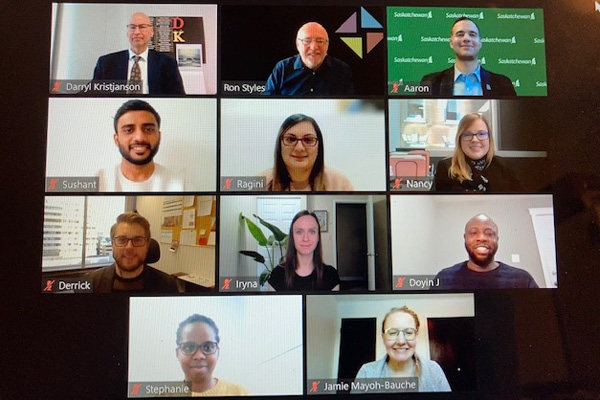
JSGS students compete virtually in the 2021 internal case competition
Held on Friday, November 26, the JSGS internal case competition encouraged students to work together in a virtual format as they tested their knowledge and expertise.
By Isaac Dykes, Marketing and Communications AssistantHeld on Friday, November 26, the JSGS internal case competition encouraged students to work together in a virtual format as they tested their knowledge and expertise.
In the past, the annual internal case competition has covered many federal and provincial policy subjects, including challenging and multi-faceted topics of discussion such as the legalization of marijuana, foreign worker programs, national and provincial health crisis control, to challenge students’ opinions, presentation skills, and policy knowledge.
“The JSGS case competition is an event that allows students to receive feedback and advice from senior leaders in a risk-free environment while testing their abilities in a friendly and competitive format,” said Dale Eisler, JSGS Policy Fellow and case study author.
This year’s fictional case study had students provide two options for the government to consider as a first step in the process of asserting greater provincial control and the implications associated with each option. The student teams rose to the challenge to outline the fiscal consequences for the province and many other variables including employment, the efficiency of delivery, and effects on the relationship between the provincial and federal governments.
Eisler chose this topic because of “logical timing” and appropriateness due to Premier Moe’s expressed desire for Saskatchewan to increase its autonomy from the federal government in several areas of shared jurisdiction, including policing, taxation, and immigration.
“I wanted the students to practice their case skills in a situation that is relevant and complex.”
This case was no small task for the student teams, but they did an excellent job in coming together to provide the panel of judges with thoughtful and well-informed recommendations. In the end, first place was awarded to Iryna Bajraktari (MPA, USask), Doyin Jibod (MPA, U of R), Stephanie Onokwai (MPA, USask), and Sushant Sharma (MPA, USask).
Bajraktari and Sharma were also selected as two of four members who will represent the school this winter at the national case competition, organized and supported by the Canadian Association of Programs in Public Administration (CAPPA). Joining them are Heather Barlow from the USask campus and Abimbola Ojo from the U of R campus. They will be mentored by coaches and JSGS alumni Nancy Carlson (MPA’14), Senior Trade Policy Analyst, Ministry of Trade and Export Development, Government of Saskatchewan, and Derrick Lepine (MPA’17), Director, Labour Market Intergovernmental, Ministry of Immigration and Career Training, Government of Saskatchewan.

A special thank you to the judges and everyone else who assisted in putting this year’s case competition together.
- Aaron Wirth (MPA’10), Executive Director, Climate Change Branch, Ministry of the Environment, Government of Saskatchewan; and Board Member, JSGS Alumni Association
- Darryl Kristjanson, Executive Director, Budget Review, Ministry of Finance, Government of Saskatchewan
- Ragini Prabhakar (MPA’19), Policy Analyst, Ministry of Energy, Government of Alberta
- Ron Styles, Executive-In-Residence, Johnson Shoyama Graduate School of Public Policy
On behalf of the entire school, we wish the national team the best of luck as they compete against policy schools from across the country.

